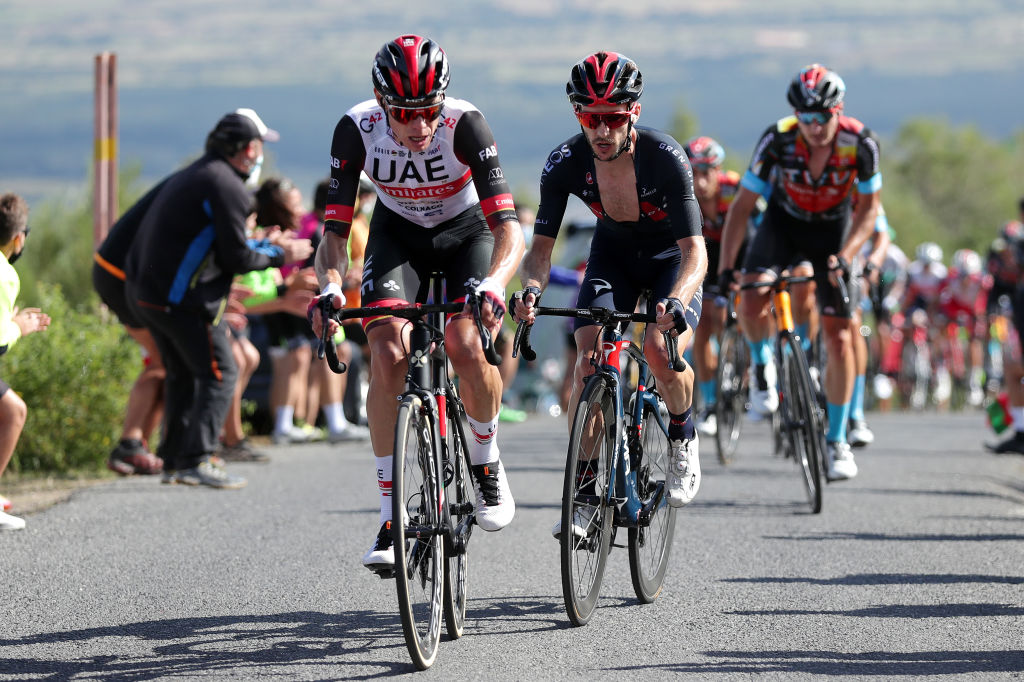Vuelta a España: Adam Yates’ offensive thwarted by headwind at Picón Blanco
Bernal finishes with Briton while Carapaz loses a minute on race’s first summit finish

The Vuelta a España is still long, but at least one prong of the Ineos Grenadiers trident was blunter than the others at Picón Blanco on stage 3, where Richard Carapaz struggled and conceded a minute to the red jersey group. Adam Yates, a repeat if exasperated attacker in the closing kilometres, was clearly the sharpest, while Egan Bernal was robust enough to cross the line in the same time as his chief rival Primož Roglič (Jumbo-Visma).
On the eve of the stage, Ineos Directeur Sportif Matteo Tosatto told Cyclingnews that the road – specifically, the road uphill – would ultimately decide the leadership hierarchy of his team on this Vuelta. If the race’s recent history is any guide, Carapaz’s situation is not entirely irretrievable, but Yates and Bernal clearly bear the more reliable credentials at this early juncture.
Yates, mind, wasn’t inclined to couch it quite that way atop Picón Blanco after he came home in eighth place, in the same time as Roglič and Bernal, 1:48 behind stage winner and new maillot rojo Rein Taaramäe (Intermarché-Wanty-Gobert Matériaux).
“Not really,” Yates said when asked if he was now Ineos’ leader. “Like we said from the beginning, we’ve got cards to play. I lost some time yesterday but I’m still in the game, so we’ll just keep plugging away and hopefully we can do something.”
Yates, who was withheld from the Tour de France in order to prepare for the Vuelta, was Ineos’ strongest performer in the short opening time trial in Burgos, but he endured frustration on the outskirts of the same city on Sunday afternoon when he lost half a minute after getting caught behind a late crash on stage 2.
That incident left him 51 seconds behind Roglič and the Briton appeared eager to start recouping those losses at the earliest available opportunity, which presented itself on the stiff climb to Picón Blanco. But while the double-digit gradients lent themselves to Yates’ pugnacious style, the brisk headwind he encountered near the summit placed a natural dampener on his attacks.
Yates made two sustained accelerations in the final two kilometres, but he was unable to shake off men like Roglič, Enric Mas (Movistar) and Mikel Landa (Bahrain Victorious). His efforts did, however, eventually help to burn off Romain Bardet (DSM), Hugh Carthy (EF Education-Nippo) and Aleksandr Vlasov (Astana-Premier Tech). The first attack perhaps also definitively distanced Carapaz, who had just about fought his way back on after being dropped earlier on the climb.
Get The Leadout Newsletter
The latest race content, interviews, features, reviews and expert buying guides, direct to your inbox!
“I was pretty disappointed after yesterday at losing time due to the crash, so today I tried,” Yates said. “I really wanted to do something. I tried one or two times but it was a block headwind up here, so no matter what you did you weren’t going to get very far. It is what it is.”
In the overall standings, Yates now lies 16th overall, 1:21 behind the new leader Taaramäe and still 51 seconds off Roglič. Bernal, ninth at 57 seconds, remains the best placed of the Ineos squad and moves into the white jersey of best young rider. Carapaz drops to 27th overall at 2:15, having been docked a further 20 seconds by the commissaires for an unauthorised feed at the foot of the final climb.
En route to Giro d’Italia victory in May, Bernal defied his own expectations by making a fast start and proving himself the strongest rider in the race from the very opening exchanges. He looked a little more laboured here but he was able to cling tightly to Roglič’s rear wheel in the final two kilometres, and the performance marked a significant improvement on his display on the same climb at the Vuelta a Burgos barely two weeks ago.
In a recent radio interview in Colombia, his friend and sometime training partner Oscar Sevilla suggested that Bernal’s Vuelta strategy would be built around limiting his losses in the opening two weeks with an eye to the succession of tough mountain stages in the race’s final act. In that light, Bernal will not be entirely displeased with his showing at Picón Blanco, even if Yates was the more ambitious of the Ineos leaders on its steepest slopes.
“I wouldn’t say I was comfortable, but in the end I’ve trained well, I’ve prepared well,” Yates said. “I really struggled at the Olympics with the jet lag, and it took me a week or two to get back into the routine. And yeah, here we are, I hope it continues.”

Barry Ryan was Head of Features at Cyclingnews. He has covered professional cycling since 2010, reporting from the Tour de France, Giro d’Italia and events from Argentina to Japan. His writing has appeared in The Independent, Procycling and Cycling Plus. He is the author of The Ascent: Sean Kelly, Stephen Roche and the Rise of Irish Cycling’s Golden Generation, published by Gill Books.